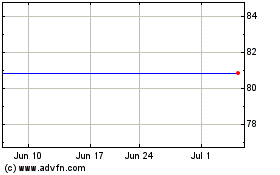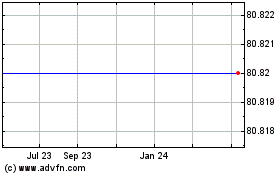St. Jude Medical, Inc. (NYSE:STJ) today announced it will
sponsor the SCD-HeFT 10-Year Follow-up Study, along with the
National Heart, Lung, and Blood Institute (NHLBI) – part of the
National Institutes of Health. The study will revisit 1,855
patients who participated in the original SCD-HeFT (Sudden Cardiac Death in Heart Failure Trial) to determine long-term outcomes 10
years after their last recorded follow-up. The SCD-HeFT 10-Year
Follow-up Study will be led by Dr. Gust H. Bardy at the Seattle
Institute for Cardiac Research (SICR), who was also the principal
investigator in the original SCD-HeFT.
The original SCD-HeFT study proved the effectiveness of ICD
therapy over placebo or amiodarone (a medication used to treat
irregular heartbeats) for a specific population of patients, and
was instrumental in changing the national reimbursement policy for
ICD therapy. The SCD-HeFT outcome findings remain a key reference
point for all other ICD evaluations for patients with congestive
heart failure (HF). The trial was conducted from 1997-2003 and
studied 2,521 patients with HF for an average follow-up period of
45.5 months. It was and remains the largest, longest and only
placebo-controlled, randomized, multicenter trial of implantable
cardioverter defibrillator (ICD) therapy.
At the time of the presentation of the SCD-HeFT findings in
March 2004, the patients who had not yet received an ICD were given
the option to receive one. It is estimated, however, that few of
the patients in the placebo or amiodarone groups ultimately
received an ICD, essentially maintaining the original study groups
of HF patients treated either with ICD or non-ICD therapies. As a
result, long-term results of these two patient groups can likely
still provide significant findings regarding the long-term efficacy
of ICD therapy.
Today marks the median 10-year anniversary of follow-up for the
SCD-HeFT population. The SCD-HeFT 10-Year Follow-up Study will
attempt to investigate all surviving patients and those who have
succumbed since the end of the original trial by recontacting the
148 institutions participating in the trial (136 in the U.S., 11 in
Canada and one in New Zealand). The follow-up data obtained in this
project will be merged with the original SCD-HeFT database
collected during the original trial, thus providing a long-term
follow-up profile on all patients that were enrolled.
“The outcome of SCD-HeFT changed medical practice, but despite
the virtues of the trial, many key questions remain regarding
long-term efficacy, complications and cost of ICD therapy,” said
Dr. Bardy. “We believe the results of this study have the potential
to help direct long-term ICD management for the foreseeable
future.”
The primary goals of the SCD-HeFT 10-Year Follow-up Study
are:
1.) To compare 10-year mortality data of
the remaining 1,855 SCD-HeFT patients in the three arms of the
trial (ICD, placebo and amiodarone) since the close of the
follow-up on Oct. 31, 2003.
2.) To obtain outcome data in the major
subgroups of SCD-HeFT: ischemic versus non-ischemic; New York Heart
Association (NYHA) Class II HF versus NYHA Class III HF; and in
women and minorities.
3.) To obtain 10-year ICD use rates,
complication rates, lead failure rates and replacement rates.
4.) To validate or refute the observation
that amiodarone increases mortality in NYHA Class III patients.
5.) To obtain 10-year hospitalization and
major procedure data.
6.) To obtain 10-year quality of life
data.
“We believe the patient groups examined in SCD-HeFT can provide
additional insights regarding the long-term benefits of ICD
therapies,” said Dr. Mark Carlson, chief medical officer and senior
vice president of research and clinical affairs for the St. Jude
Medical Cardiac Rhythm Management Division. “Our sponsorship of
this study demonstrates our commitment to advancing the practice of
medicine by providing physicians with clinically relevant
information that has an impact the decisions they make about
treating patients with heart failure.”
The original SCD-HeFT, also sponsored by the NHLBI, with
supplementary sponsorship by Medtronic and Wyeth Ayerst, provided
solid data to the Centers for Medicare and Medicaid Services who
approved payment of ICD therapy in ischemic and non-ischemic
systolic dysfunction patients with left ventricular ejection
fractions (EF) ≤ 35% and with NYHA Class II and Class III
congestive HF. Other studies, such as the Multicenter Automatic
Defibrillator Implantation Trial 2 (MADIT-II) eight-year study,
sponsored by Boston Scientific, have also demonstrated the
long-term mortality benefits of ICD therapy – that study found
unadjusted mortality figures at eight years in patients with prior
myocardial infarction were 45% for the ICD recipients and 61% for
those in the control group.
Heart failure occurs when the heart is unable to pump enough
blood to meet the body’s demands. It usually occurs due to
progressive dysfunction of the heart muscle over time, rather than
an acute and abrupt event. Heart failure results in the build-up of
fluids, or congestion, throughout the body, which can lead to
shortness of breath, swelling, and potentially lethal heart rhythm
abnormalities. Over five million Americans have HF with 550,000 new
cases diagnosed each year. The disease is one of the most costly to
the U.S. healthcare system, costing an estimated $33.2 billion in
2007.
An ICD is a small device implanted in the chest to treat
potentially lethal, abnormally fast heart rhythms (ventricular
tachycardias or ventricular fibrillation), which often lead to
sudden cardiac death (SCD). Nearly 1,000 people every day and more
than 350,000 every year in the U.S. die from SCD. An ICD delivers
potentially life-saving therapy from the device to the patient's
heart through an insulated wire or lead.
About St. Jude Medical
St. Jude Medical develops medical technology and services that
focus on putting more control into the hands of those who treat
cardiac, neurological and chronic pain patients worldwide. The
company is dedicated to advancing the practice of medicine by
reducing risk wherever possible and contributing to successful
outcomes for every patient. Headquartered in St. Paul, Minn., St.
Jude Medical employs more than 14,000 people worldwide and has four
major focus areas that include: cardiac rhythm management, atrial
fibrillation, cardiovascular and neuromodulation. For more
information, please visit sjm.com.
Forward-Looking Statements
This news release contains forward-looking statements within the
meaning of the Private Securities Litigation Reform Act of 1995
that involve risks and uncertainties. Such forward-looking
statements include the expectations, plans and prospects for the
Company, including potential clinical successes, anticipated
regulatory approvals and future product launches, and projected
revenues, margins, earnings and market shares. The statements made
by the Company are based upon management’s current expectations and
are subject to certain risks and uncertainties that could cause
actual results to differ materially from those described in the
forward-looking statements. These risks and uncertainties include
market conditions and other factors beyond the Company’s control
and the risk factors and other cautionary statements described in
the Company’s filings with the SEC, including those described in
the Risk Factors and Cautionary Statements sections of the
Company’s Quarterly Reports on Form 10-Q for the fiscal quarters
ended April 4, 2009, July 4, 2009 and October 3, 2009. The Company
does not intend to update these statements and undertakes no duty
to any person to provide any such update under any
circumstance.
SJM (NYSE:STJ)
Historical Stock Chart
From Sep 2024 to Oct 2024

SJM (NYSE:STJ)
Historical Stock Chart
From Oct 2023 to Oct 2024
